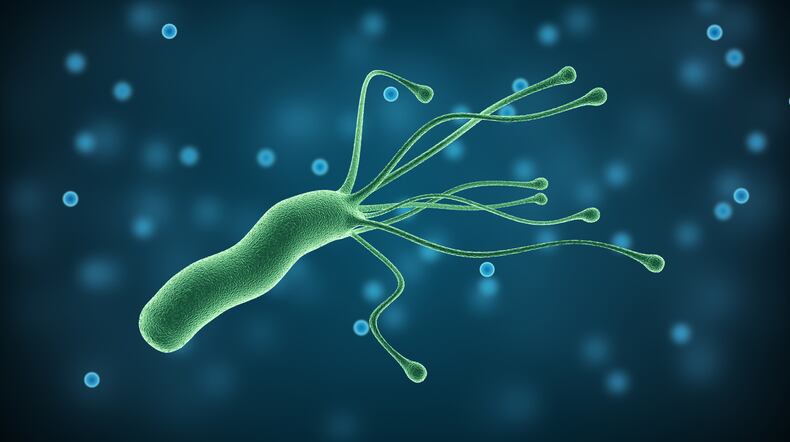The researchers, from Guangxi Medical University, conducted a meta-analysis that reviewed data from 16 randomized controlled trials involving 1,364 patients. They subsequently concluded that folic acid improved recovery, enhances stomach function, and may reduce side effects during treatment.
CAG: A growing global concern
CAG is a long-term stomach condition marked by the thinning of the stomach lining. It can lead to digestive issues and increase the risk of developing gastric cancer. The condition is often caused or worsened by H. pylori, a bacteria that infects the stomach and is classified as a known cancer risk by health authorities.
In most cases, standard treatment for H. pylori infection involves antibiotics and acid-reducing drugs.
This meta-analysis showed that adding folic acid to that standard treatment increased the total effective rate from 79.06% to 95.09%, with folic acid helping to repair the stomach lining more effectively.
The pooled risk ratio (RR) was 1.19, meaning patients receiving folic acid were 19% more likely to benefit from treatment.
Lower side effects reported with folic acid use
The study also looked at how safe folic acid was when used alongside other medications. Across eight trials, the participants who had received folic acid experienced fewer side effects (11.64%) compared to those who had not received it (14.04%).
Although this difference was not statistically significant, the result suggested that folic acid did not add risk and might even improve patient tolerance to treatment.
Common side effects included nausea, constipation, and dizziness. Interestingly, anaemia occurred more often in the group that did not receive folic acid, while dizziness appeared slightly more frequently in the folic acid group.
Improved stomach function seen with folic acid
The researchers found that folic acid helped improve levels of pepsinogen I (PGI) and the pepsinogen I/II ratio (PGR) — two key indicators of stomach health.
These markers help doctors assess how well the stomach is functioning and whether the lining is recovering.
In five of the trials, patients who received folic acid had significantly better PGI readings, while two trials also showed that folic acid improved the PGR ratio.
These results suggest folic acid may play a role in restoring damaged stomach tissue and improving overall digestion.
Short-term gains clear, long-term data lacking
Treatment duration varied between studies, from as short as one week to as long as 12 weeks. Most trials used 30mg of folic acid per day, and in a few cases, the supplement was combined with vitamin B12.
The study found no significant difference in results based on the treatment duration or folic acid regimen.
However, the researchers noted that longer-term data was still missing. For instance, they did not determine how long the benefits of folic acid lasted or what the ideal treatment length should be.
At the same time, all the 16 trials they analysed had been conducted in China. While this allowed for a focused review, it raised questions about whether the results could be applicable globally. As such, the study’s authors urged researchers in other regions to conduct similar trials to confirm if folic acid had the same benefits for broader populations.
Bismuth and vonoprazan offer additional promise
The report also discussed other stomach-protecting treatments like bismuth and vonoprazan. Bismuth is often used in combination with antibiotics to treat H. pylori, while vonoprazan is a newer acid blocker that works faster and lasts longer than traditional proton pump inhibitors.
Some of the studies reviewed included bismuth or vonoprazan in their regimens.
These appeared to enhance treatment outcomes, especially when combined with folic acid. However, the authors emphasised that more research was needed to confirm these benefits.
Bottom line for healthcare and nutrition
For patients with H. pylori-related chronic gastritis, this study offered new evidence supporting the addition of folic acid to existing treatment plans. Not only does folic acid improve treatment success rates, but it also appears to be safe and may help repair stomach damage more effectively.
The researchers recommended that doctors consider folic acid as a supplement for patients undergoing H. pylori treatment, particularly in cases of CAG. They also called for global trials to better understand folic acid’s role in diverse populations and to define the best treatment protocols.
They concluded the report, saying: “H. pylori -related CAG, as early as possible anti-H. pylori treatment and folic acid supplementation should be taken. Gastric mucosal protective agents can improve the curative effect and can be selected according to the condition of patients with obvious adverse reactions.
“For patients with obvious adverse reactions, gastric mucosal protective agents can be selected according to their condition. If bismuth is not included in the anti-H. pylori regimen, bismuth is recommended. Our results may provide potential evidence for the clinical application of folate in CAG treatment. Future studies should focus on the efficacy of folic acid therapy for CAG in different regions and optimize the regimens of folic acid therapy continuously.”
Source: BMC Gastroenterology
“Efficacy analysis of folic acid in chronic atrophic gastritis with Helicobacter pylori infection: a systematic review and meta-analysis”
https://doi.org/10.1186/s12876-025-03644-1
Authors: Hui Li, et al.




